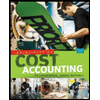
Concept explainers
Concept introduction:
Decision making plays an important role in the management. The decisions taken by managers are called managerial decisions. Managerial Decisions are decisions taken by managers for the operations of a firm. These decisions include setting target growth rates, hiring or firing employees, and deciding what products to sell. Manager’s decisions are taken on the basis of quantitative as well as the qualitative measures. The managerial decision includes the decisions like make or buy, accept or reject new offers, sell or further process etc. These decisions are taken on the basis of relevant costs.
Relevant costs are the costs that are relevant for any decision making. Relevant costs are helpful for take managerial decisions like make or buy, accept or reject new offers, sell or further process etc.
Two basic types of the relevant costs are as follows:
- Out-of-pocket costs
- Opportunity costs
To indicate:
The true or false statements.
Want to see the full answer?
Check out a sample textbook solution
Chapter 10 Solutions
MANAGERIAL ACCOUNTING FUND. W/CONNECT
- I am looking for the correct answer to this general accounting question with appropriate explanations.arrow_forwardI need help solving this general accounting question with the proper methodology.arrow_forwardCan you help me solve this general accounting problem using the correct accounting process?arrow_forward
- Principles of Accounting Volume 2AccountingISBN:9781947172609Author:OpenStaxPublisher:OpenStax College
 Principles of Cost AccountingAccountingISBN:9781305087408Author:Edward J. Vanderbeck, Maria R. MitchellPublisher:Cengage Learning
Principles of Cost AccountingAccountingISBN:9781305087408Author:Edward J. Vanderbeck, Maria R. MitchellPublisher:Cengage Learning


